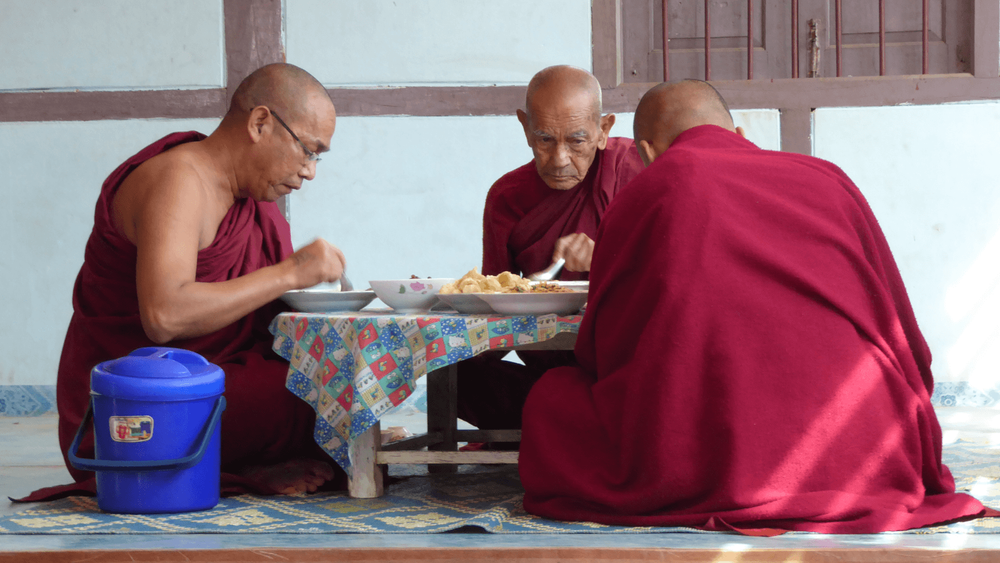Is a Buddhist diet vegan? It’s more complex than you'd think
Buddhism is a religion famous for its approach to compassion and enlightenment. As with any religion, the Buddha's teachings can be interpreted in a myriad of ways, and the same goes for the Buddhist stance on food. There isn’t a universal Buddhist diet that everyone follows in exactly the same way as one another.
Are Buddhists vegan? Not necessarily, in fact, not all Buddhists are even vegetarians. But that doesn't mean the religion doesn't have a rich vegan culture. From a way of life that condemns the killing of animals, what else would you expect? Join us for plenty of facts about Buddhism as we explore veganism's place in the religion.
What is Buddhism?
Buddhism is a religion that arose in India around 2,500 years ago and follows the teachings of Siddhartha Gautama (the Buddha). Today, there are over 520 million practising Buddhists across the globe, making it the world's fourth-largest religion. This article will mention two of the biggest schools of Buddhism: Theravada and Mahayana.
Buddhists are encouraged to follow a concept called the eightfold path. By following this path, practitioners can end their suffering and eventually reach enlightenment. This path is made up of eight guiding principles:
• Right understanding - Remember that actions have consequences
• Right intention - Follow the Buddhist path
• Right speech - Don't lie, slander, abuse, gossip etc.
• Right action - Behaving in a way that doesn't harm others, e.g. killing, stealing etc.
• Right livelihood - Earn a living that doesn't cause harm, e.g. no trading livestock or weapons
• Right effort - Avoid unwholesome thoughts and feelings
• Right mindfulness - Become aware of your thoughts and feelings
• Right concentration - Practice meditation
Veganism in Buddhism
Is veganism an essential part of Buddhism? Put simply - no.
Some Theravada Buddhists will argue that since the Buddha wasn't vegetarian or vegan, removing animal products from the Buddhist diet isn't necessary to achieve enlightenment. Surprisingly, the Buddha even laid down rules for eating meat. Essentially, it's okay for monks to eat meat as long as it was a donation and the animal wasn't killed specifically for them.
However, for a Buddhist monk living in a monastery, eating meat is not a personal choice. They can't go to the local supermarket and pick out all their favourite goodies. Instead, Buddhist monks often survive purely on donations.
But most Buddhists aren't monks living in monasteries - especially here in the UK. So, what did the Buddha say about eating animal products for everyone else?
Again, nothing. But, as Buddhism strictly prohibits taking life and causing harm to others, many interpret this as following a vegan diet. For example, in the Mahayana sect of Buddhism, there are clear and strict rules that condemn eating meat (no caveats for monks here).
And since it's impossible to create meat without harming animals, this makes a lot of sense. Buying a steak from your local butcher is just causing suffering by proxy. While you didn't personally kill an animal, you did fund the process.
Even in the Theravada practice, where eating meat is allowed under certain conditions, lay people (non-monks) are still advised to eat a vegetarian or vegan diet. Why? To avoid funding unethical animal farming practices.
So, what about milk and eggs? The Buddha taught us to respect animals. Still, we've all seen how modern farming practices treat them. We're talking cramped factory farms riddled with diseases. Calves removed from their mothers for increased milk production. And the purposeful killing of male chicks in the egg industry. There's suffering wherever we look.
The lowdown
If you're interpreting 'right action' as not to intentionally cause harm, even by proxy, veganism is the way forward. It's a compassionate diet that removes unnecessary suffering from our food supply. And plenty of great healthy vegan food recipes are just waiting for you online!
Yet since the Buddha didn't teach us not to, consuming animal products doesn't mean you're not Buddhist. At the end of the day, it's all down to each individual's interpretations of the Buddha's teachings.
Above all else, be mindful of what you eat and where it comes from. Does something have to suffer for you to eat dinner, or is there a compassionate option instead?
If you enjoyed learning about how veganism and Buddhism overlap, ponder further on the topic of moral encounters with non-human animals with author David G. Brooks, and discover how tree hugging has roots in environmental activism.
